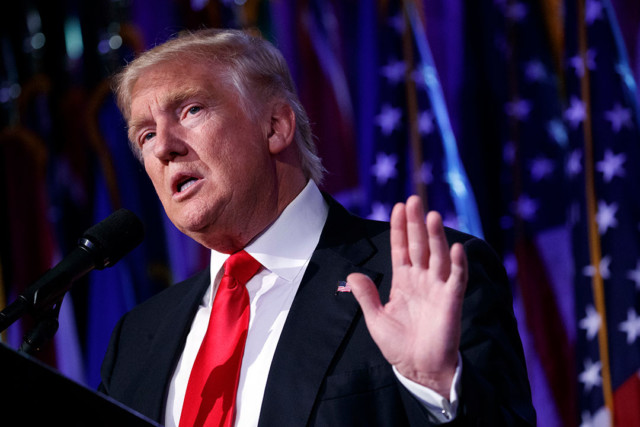In the weeks following his election victory, President-elect Donald Trump has been open about his frustration and desire to change the relationship between “the media” and The White House.
At 6am EST the day of a scheduled meeting between American media giant The New York Times and Trump, the president-elect took to his Twitter account to announce that he had cancelled the meeting after the “terms and conditions of the meeting were changed at the last moment,” deeming the move “not nice.”
I cancelled today's meeting with the failing @nytimes when the terms and conditions of the meeting were changed at the last moment. Not nice
— Donald J. Trump (@realDonaldTrump) November 22, 2016
However, just two hours before the meeting was to take place, Trump tweeted that the meeting was “back on.”
The meeting with the @nytimes is back on at 12:30 today. Look forward to it!
— Donald J. Trump (@realDonaldTrump) November 22, 2016
“We were unaware that the meeting was cancelled until we saw the President Elect’s tweet this morning,” said Eileen Murphy, senior vice president of communications at the New York Times.
In the end, the meeting took place between Trump and reporters, staff and editorial managers at the Times. Reporters were allowed to live-tweet the meeting, which made some news–including the fact that he is considering his son-in-law, Jared Kushner to work on brokering peace between the Israelis and Palestinians.
Trump: Jared Kushner could help make peace between the Israelis and Palestinians.
— Elisabeth Bumiller (@BumillerNYT) November 22, 2016
Traditionally, once a candidate has won the election, they host a press conference, however, Trump has still not held a public conference. Instead, the president-elect took straight to the “Transition 2017” YouTube channel this week to outline his policy plan for the first 100 days of his administration as well as any advances with his transition team. The move effectively skirted the media.
The traditional role and installation of a “press pool”–a team of reporters who cover and report every public movement of the president-elect, during the presidential transition, has been challenged by the nascent Trump administration. In fact, the White House Correspondents Association, the group that oversees the White House press corps, issued a public statement voicing their concerns after Trump did not take a pool of reporters with him when he met with President Obama at the White House on November 10, for their first meeting.
“The White House Correspondents’ Association is deeply concerned by President-elect Donald Trump’s decision to reject the practice of traveling with a ‘protective pool’ of reporters for his first visit to Washington since the election. In addition to breaking with decades of historical precedent and First Amendment principles, this decision could leave Americans blind about his whereabouts and well-being in the event of a national crisis. A pool of reporters is in place and ready to cover President-elect Trump. The WHCA urges President-elect Trump to allow it to do its job, including being present for motorcade movements, meetings, and other interactions. Not allowing a pool of journalists to travel with and cover the next president of the United States is unacceptable,” the group’s president, Jeff Mason, wrote in the statement.
Trump did appear for a long sit-down with CBS’ “60 Minutes,” along with his eventual appearance with The New York Times. During the CBS interview, the newly minted president-elect shared some insight into his thinking with regards to foreign policy, health care reform, as well as the press. “I think the press tries to make you into something a little bit different. In my case, a little bit of a wild man. I’m not. I’m actually not. I’m a very sober person,” Trump said during the interview.
Two weeks after Election Day, Trump met with executives and anchors from CNN, ABC, CBS, NBC, and MSNBC. According to Senior Trump Adviser Kellyanne Conway, the meeting is part of an effort to “hit the reset button” after a “hard-fought campaign.”
It was during that campaign cycle, that ultimately ended between Trump and Hillary Clinton, that the now president-elect railed against media organizations, calling them “dishonest” and “failing.” He also promised to change libel laws so that it would be easier to sue media organizations over their reporting.
“One of the things I’m going to do if I win, and I hope we do and we’re certainly leading. I’m going to open up our libel laws so when they write purposely negative and horrible and false articles, we can sue them and win lots of money. We’re going to open up those libel laws. So when The New York Times writes a hit piece which is a total disgrace or when The Washington Post, which is there for other reasons, writes a hit piece, we can sue them and win money instead of having no chance of winning because they’re totally protected,” Trump said during a campaign event in February.
However, during the meeting with The New York Times Tuesday, Trump reassured the group that they would be “happy” with his commitment to the First Amendment of the U.S. Constitution, which protects the freedom of the press.
Trump gets asked about his commitment to first amendment, says, "I think you'll be happy."
— Maggie Haberman (@maggieNYT) November 22, 2016
 CGTN America
CGTN America
 President-elect Donald Trump speaks during an election night rally in New York. (AP Photo/ Evan Vucci, File)
President-elect Donald Trump speaks during an election night rally in New York. (AP Photo/ Evan Vucci, File)
